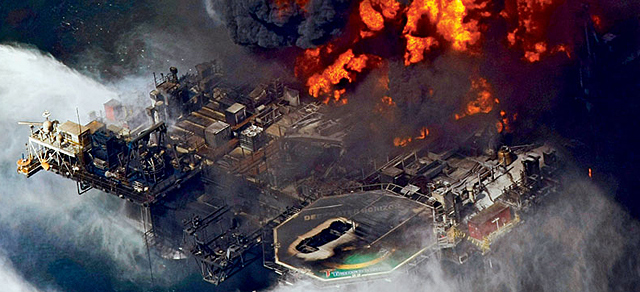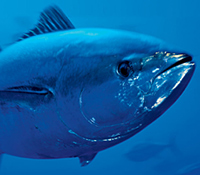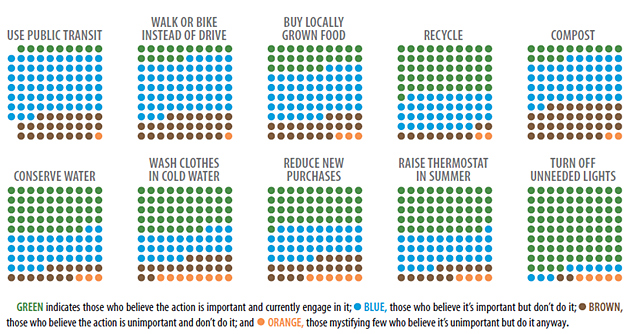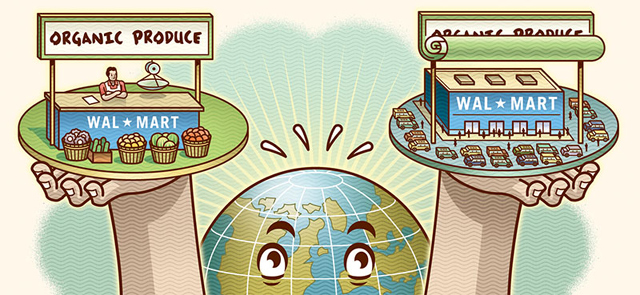sierraclub.org - sierra magazine - july/august 2010 - grapple


Grapple | With Issues and Ideas
Hitting Bottom | Up to Speed | Down to the Last Sushi | Good Intentions | As the World Warms |
Woe Is Us | Sunscream
Hitting Bottom
Every day, in every way, we need to get off oil

The Deepwater Horizon cataclysm: a wakeup call for a nation drunk on oil.
A popular view of addiction is that addicts need to hit bottom before they can begin recovery. That nadir can take the form of a DUI charge, a divorce—anything that dramatically demonstrates the destructiveness of their behavior.
If, as even George W. Bush acknowledged, the United States is addicted to oil, BP's Gulf of Mexico oil disaster is as low as we can go. It left 11 workers dead, hundreds of thousands of gallons of oil a day gushing into the gulf, fragile ecosystems under seige, and billions of dollars of economic damage to the fishing and tourism industries. So now, as in many addiction recovery programs, it's time to pass through the five stages of grief.
Denial: "The sky is not falling," Quenton R. Dokken, executive director of the Gulf of Mexico Foundation, "a conservation group in Corpus Christi, Tex.," told the New York Times. "We've certainly stepped in a hole and we're going to have to work ourselves out of it, but it isn't the end of the Gulf of Mexico." ProPublica later pointed out that half of the foundation's board members have ties to the offshore oil industry and one is an executive at Transocean, owner of the Deepwater Horizon rig.
Anger: "What the hell did we do to deserve this?" groused BP CEO Tony Hayward to fellow executives.
Bargaining: BP agreed to cover the spill's cleanup costs but not its economic damages. "It wasn't our accident,"
Hayward said on the Today show. "The drilling rig was a Transocean drilling rig. It was their rig and their equipment that failed." Current law caps BP's liability at $75 million; the "Big Oil Bailout Prevention Act" before Congress at press time would retroactively raise that limit to $10 billion.
Depression: "'Drill, baby, drill,' has lost whatever usefulness it may have had as a slogan," lamented the pro-drilling National Review.
Acceptance: Here's Thomas Friedman in the New York Times: "The only meaningful response to this man-made disaster is a man-made energy bill that would finally put in place an American clean-energy infrastructure that would set our country on a real, long-term path to ending our addiction to oil." —Paul Rauber
ON THE WEB Join the BP Oil Disaster group on Climate Crossroads.
Down to the Last Sushi
 At the top of the Atlantic Ocean food chain is the bluefin tuna, a half-ton hunting machine that can accelerate faster than a Porsche. Yet it is powerless against the appetites of wealthy Japanese diners: Industrial fishing has reduced bluefin numbers by two-thirds in the Mediterranean and 80 percent in the Atlantic.
At the top of the Atlantic Ocean food chain is the bluefin tuna, a half-ton hunting machine that can accelerate faster than a Porsche. Yet it is powerless against the appetites of wealthy Japanese diners: Industrial fishing has reduced bluefin numbers by two-thirds in the Mediterranean and 80 percent in the Atlantic.
A fishing ban could restore healthy numbers within a decade, but at the Convention on International Trade in Endangered Species this March in Qatar, Japan marshaled 68 nations to vote against a ban on international trade in the vanishing fish—after treating them to a bluefin sushi buffet.
What's motivating Japan and the other tuna-fishing nations is more than a taste for raw fish. Prized bluefin sell at auction in Tokyo for as much as $175,000 apiece. Presumably the very last bluefin will fetch an even higher price. —P.R.
Good Intentions
OK, Sierra reader: How do you measure up? The Yale Project on Climate Change and the George Mason University Center for Climate Change Communications polled 1,001 adults on their conservation practices; the graphic below shows what percentage walk their environmental talk. Remember that things like public transit and locally grown food are not equally available. But anyone can ride a bike. —P.R.

AS THE WORLD WARMS
Quick thinking before we slowly fry
CAR SWAPPERS Americans may love cars, but that doesn't mean they have to marry one. Car-sharing companies in dozens of cities allow members to hook up with a conveniently located car whenever the need strikes. U.S. car-share membership grew by 117 percent, to 454,000, between 2007 and 2009 and is expected to reach 4.4 million by 2016. Car sharers drive 31 percent less than car owners, resulting in nearly half a million fewer tons of CO2 emissions.
CLAPTRAP APP Say you're at a cocktail party and find yourself buttonholed by a climate-change denier who insists that carbon dioxide is good for the earth. A free iPhone app from Skeptical Science can supply you with comebacks to common climate-skeptic talking points as well as peer-reviewed studies, graphs, and charts to back you up.
NO MORE ISLAND To Bangladesh it was South Talpatti; to India, New Moore Island. Both countries claimed the 1.3-mile-long islet, hoping to exploit its oil and gas reserves, but rising waters in the Bay of Bengal have swallowed it entirely, solving the territorial dispute.
SMOKEABLE SOLAR Researchers at the University of California at Berkeley are using a genetically modified virus to reprogram cells in tobacco leaves to convert photons into electrons. Practical application is still way in the future, but the goal is to produce solar cells that are cheap, nontoxic, and biodegradable. —Dashka Slater

ON THE ONE HAND . . .
Having established its green cred by becoming the nation's largest buyer of local and organic produce, Wal-Mart is turning its attention to its climate impact. In February the company announced plans to reduce the greenhouse-gas emissions of its global suppliers by 20 million tons by 2015—the equivalent of taking 3.8 million cars off the road for a year. By requiring vendors to cut waste, packaging weight, and energy use, the retail behemoth multiplies its impact. Fred Krupp, president of the Environmental Defense Fund, says Wal-Mart "will transform a vast supply chain here at home and around the world."
ON THE OTHER . . .
Even when solar-powered and filled with organic produce, Wal-Mart's King Kong-size stores chew up open space, contaminate waterways, and flatten local businesses closer to people's homes. More than half of Wal-Mart's 4,361 U.S. stores are 200,000-square-foot "Supercenters." Each generates 10,000 car trips every weekday and is surrounded by roughly 13 acres of parking lot, which unleashes more than 300,000 gallons of petrochemical-contaminated runoff during a one-inch storm. Says Stacy Mitchell of the community-planning nonprofit the New Rules Project, "This is a company that's had an extraordinary impact on the amount Americans drive." —D.S.
Woe Is Us: Ready, set, panic.
 Extinct as Apple Pie
Extinct as Apple Pie
So you think you can manage without Delta smelt or Furbish's lousewort. But do you want to live in a world without apple pie and a cup of joe?
The wild ancestors of today's pippins, Fujis, Granny Smiths, and Gravensteins originated in the forests of Central Asia. Since the middle of the last century, more than 90 percent of those forests have been destroyed by disease, fire, desertification, or agriculture. Malus sieversii, the progenitor of all modern apples, has lost 70 percent of its habitat in Kazakhstan over the past 30 years.
Those Edenic apples may be critical to the survival of their highly refined descendants. Cultivated apples are suffering from a stagnant gene pool that makes them vulnerable to fungi, viruses, and other ills. While there were once 14,000 apple cultivars in North America, today 11 varieties account for 90 percent of our apples.
With such diminished genetic variation and the original fruit disappearing, a catastrophic blight like the one that almost wiped out the potato in the 1840s could doom the apple as we know it.
As for coffee, climate change is subjecting the delicate berries to both drought and unseasonable rainfall, as well as pests. Production is down around the world: There has been an estimated 28 percent decline in Latin America, while drought has destroyed the entire crop in some areas of Kenya. Would you like a chai latte with that mock-apple pie, hon? —D.S.
Sunscream
FDA punts on protection
Sixteen Years after the Food and Drug Administration first proposed that sunscreens do more than keep people from getting burned, many still don't block the ultraviolet-A (UVA) rays that age the skin and may lead to cancer.
In April, a coalition of 72 dermatologists, scientists, and consumer advocates urged the FDA to "move quickly" to finalize the enforceable UVA standards that have been under discussion since 1994. Although the labels on many sunscreens say they protect against UVA, "when we look at the ingredients, there are no UVA-active ones," said Rebecca Sutton, a senior scientist at the Environmental Working Group.
The FDA was expected to issue regulations mandating UVA protection in May, but the agency put off the new rule until October—meaning yet another summer without full protection.
—Frances Cerra Whittelsey
Photos and illustrations, from top: AP Photo/Gerald Herbert; Solvin Zankl (captive); John Ueland; Peter and Maria Hoey